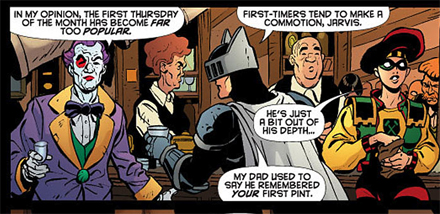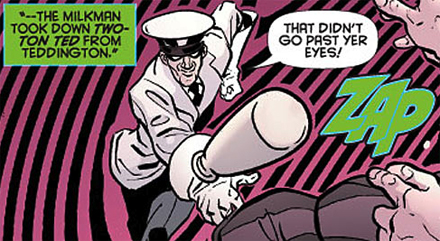DOUGLAS: Here I was, thinking that Paul Cornell was going to do the insanely huge amount of worldbuilding he was promising for his Knight & Squire miniseries in the background (along the lines of the rivalry between the Pearly King and King Coal in Batman and Robin), and instead he foregrounds it all–page after page of quick namechecks of characters, bricks of expository dialogue. Odd, though, that there didn’t seem to be much of a plot here, beyond “is the Sacha Baron Cohen character going to decide to be a hero or a villain?” And what I really miss from the Grant Morrison incarnation of the characters is the way Beryl and Cyril play off each other–they barely talk to each other in this issue.

I figure I’m missing most of the jokes in this issue (although I noticed a particularly smutty bit of Cockney rhyming slang on the first page). The only thing I actually cracked up at was the posh old U.K. Joker dismissing the idea of committing crimes as “infra dig.” And what was Wildcat doing in here, anyway? Is that another joke I missed? Help us, Graeme!
(More on Techland: “Deadpool” and “Daredevil: Black and White”)
GRAEME: You’re on your own with that one, I’m afraid – If Wildcat serves any purpose here other than “obligatory guest star,” I have next to no idea what it is. Maybe Cornell is a big fan of the old Bob Haney Brave and Bolds?
DOUGLAS: This is the sort of series I’d prefer to read in eight-page chunks in a Batman Family comic book–light comedy relief to counterbalance something else. As it is, I suppose it counterbalances a lot of the rest of the stuff I brought home from the store, but that’s not the same, somehow.
EVAN: I’m almost afraid to say it, but there’s a fair bit of camp in this Knight & Squire, amirite? It’s this weird inverted camp where the wackiness is super-serious. Don’t get me wrong; I liked it. Structurally, this issue kept me guessing. I figured the breaking of the truce magic was something that would be a through-line for the whole series. So, when the whole thing wound up being done-in-one, I was really surprised. That also made bolstered the old-school feeling of the proceedings.
It’s probably unfair to keep comparing Cornell and Morrison, but the set-up reminds me a lot of what Millar and Morrison did on Aztek: the long-tail history of a new venue alluded to in the background. But, as Douglas said, it all happens up front. (I also think that’s part of the Silver Age/camp vibe I’m getting here.)

And, man, even with all the glossary terms in the back, I was just drowning in all of the Brit-slang. It’s like the “do you speak jive” moment in Airplane!, only with capes and pints.
MIKE: Douglas, who had the rule that any comics taking place in the UK were not allowed to feature Big Ben or Parliament? Was that Morrison? As soon as I looked at the cover of this book, with the giant Big Ben in the background, I immediately thought of that broken rule. The first few interior pages go from breaking that rule to stomping on it with the parade of landmarks that scream “Hey, we are in London town!”
DOUGLAS: Yeah, I think the “no Big Ben” rule only applied to that Morrison/Cameron Stewart arc in Batman & Robin that was the last time we saw Knight & Squire at length…
MIKE: Like the rest of my co-clubbers that are based in the colonies, I missed much of the slang. Not all of it. I’ve had British coworkers in the past that have schooled me, and I’ve seen most of Guy Ritchie’s movies, haven’t I? I was surprised how much I enjoyed this story. I was worried that it was going to be a bit Scooby-Doo, and it was, but it pulled it off. This could have easily gone too far with the camp factor. As it was it reminded me of the flashback scenes in the Watchmen. A time when being a hero or a villain was a lifestyle choice, a scene anyone could potentially take part in. The fact that some of the people in this pub had actual devastating powers was incidental. The whole thing read as a glimpse into a strange culture instead of the usual super shenanigans.
The story really made me think of the current Real Life Super Hero movement that’s gaining momentum here in the States. Speaking of the U.S., I thought it was interesting that these characters were all acutely aware of the bigger-than-life superhero culture present across the pond. It was very telling that a visit from Superman would somehow validate the gathering.
(More on Techland: The Comic Book Club: “The Last Phantom” and “Set to Sea”)
GRAEME: Weirdly, that scene reminded me very much of Morrison’s early Animal Man comics, where Superman’s guest-shot becomes this odd meta thing that makes Buddy feel part of the superhero community, even if only for a second. The most interesting thing in this issue – which, for the most part, I found disappointingly underwhelming, in part because it really does feel like exposition in search of a plot for the most part – was the idea of British inferiority to America. “The only thing that stops us being ANYTHING is US. We say that’s an American thing so we don’t have to try” is, perhaps, a little too on-the-nose, but really captures something about the UK’s cultural inferiority complex, and puts a lot of the earlier world-building into a different context. (The Shrike’s attempt at aping US urban slang, Jarvis Poker’s Joker tribute, for two – Also, I love that he’s called Jarvis, not just for the Avengers/Iron Man tweak, but also the Jarvis Cocker reference that I read into it – and the “Just ‘cos he’s from AMERICA. We don’t have to hang on his every word–” about Wildcat.)
I guess the whole thing is very camp, but it’s… dull camp, maybe? It feels, more than anything, like a particularly uninspired entry in the Carry On series (Now, there’s a UK reference that probably means nothing to anyone in the US) – a flat, occasionally-amusing story filled with stereotypes that’s meant to be comforting in its familiarity for the initiated. It’s a shame; I’d really wanted it to be a lot more.

